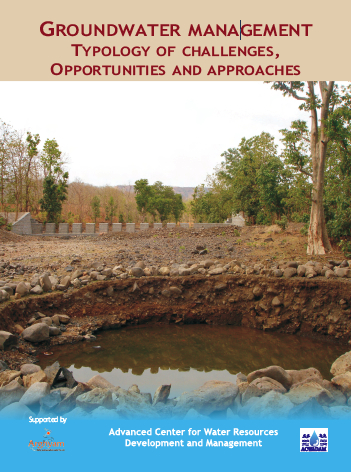/topics/groundwater
Groundwater
Dug well recharge scheme (2007-08 to 2009-10) - Revised guidelines with amendments to the scheme by the Central Ground Water Board
Posted on 24 Mar, 2010 03:46 AMThe State sector scheme on artificial recharge to groundwater through dug-wells is under implementation over the first three years of the (current) XI Plan Period (2007-12), in 1180 over-exploited, critical and semi-critical blocks/ talukas/ mandals in seven states of the hard-rock peninsular region of India, namely Andhra Pradesh, Maharashtra, Karnataka, Rajasthan, Tamil Nadu, Gujarat and Madhya Pradesh. The target beneficiary of the scheme are farmers who have privately owned wells, in their agricultural land.
Achieving drinking water security through participatory IWRM approaches in Dhasan sub-basin - A case study by WaterAid and Haritika
Posted on 20 Mar, 2010 04:05 AMThis presentation describes the work of WaterAid and Haritika in organising drinking water security through Integrated Water Resource Management (IWRM) approaches, in Dhasan river sub-basin (part of Bharar river basin), Nowgon block, Chattarpur district of Madhya Pradesh.
The wells brim with water in drought-prone Gujarat
Posted on 19 Mar, 2010 09:20 AMTHE WELLS of Kalawad village in Junagadh district, Gujarat brim with water. The reason — construction of check dams by a peasant, Mr.
Groundwater Management - Typology of challenges, approaches and opportunities - Research papers from the conference organised by ACWADAM and Arghyam at Pune (May 2009)
Posted on 17 Mar, 2010 04:40 AM A workshop on groundwater was organised by ACWADAM and Arghyam Trust in Pune in May 2009, that brought together several experts in the field, and explored diverse topics such as the importance of scale in groundwater resource planning and management, importance of aquifer typologies, participatory processes of groundwater management, groundwater regulation and groundwater linkages with watershed development, markets and policy matters.
A workshop on groundwater was organised by ACWADAM and Arghyam Trust in Pune in May 2009, that brought together several experts in the field, and explored diverse topics such as the importance of scale in groundwater resource planning and management, importance of aquifer typologies, participatory processes of groundwater management, groundwater regulation and groundwater linkages with watershed development, markets and policy matters.
The attempt of the workshop and research papers presented, was to highlight contemporary issues in groundwater management, and to look at it through the multiple lenses of hydrogeology, sociology, economics, livelihoods, environment, disasters and so on.
Course on urban rainwater harvesting, CSE, New Delhi
Posted on 12 Mar, 2010 02:00 PMTopic:Urban Rainwater Harvesting
Venue:Centre for Science and Environment, New Delhi.
The Vand women of Kachchh - A case study on drinking water management from the work of Samerth Trust in Kutch, Gujarat
Posted on 07 Mar, 2010 02:23 AMThis case study is about Samerth's efforts to achieve drinking water security, in participation with local village communities in Rapar, Kachchh (Gujarat). Arghyam has been collaborating with Samerth on this effort since 2007.
The Vand Women of Kachchh: Guest post by Keya Acharya
She gazes unflinchingly with direct eyes into the camera with a feminine mystique and physique that could, be gracing the front cover of a beauty magazine. Her red, mirror-worked blouse, in the traditional Kachchhi style worn by tribal women, is strapped at the back in stringed bows, greatly practical in the dry, wilting heat of that arid expanse of land in hinterland Gujarat called Kachchh. Her skirt is a colourful hue of printed green, and her ‘dupatta’ is a blazing red piece of cloth swept forward from her waist, partially covering her back, brought over her head and tucked back demurely into her waist again. Her name is Ammi.
The best part of the story - A case study on drinking water management from the work of Samerth Trust in Kutch, Gujarat
Posted on 07 Mar, 2010 02:18 AMThis case study is about Samerth's efforts to achieve drinking water security, in participation with local village communities in Rapar, Kachchh (Gujarat). Arghyam has been collaborating with Samerth on this effort since 2007.
The Best Part of the Story: Guest post by Keya Acharya
The landscape is barren in parts with just high heat and sun-bleached sand, the hallmarks of wastelands; in other parts there is some semblance of agriculture, with jowar, bajra and sometimes castor growing in small patches of mild green, without the lushness that good watering provides.
And in the middle of this landscape there appears, like an oasis without the accompanying palms, the ‘Tinnavahd talab’, a drinking water pond constructed by the community at Rabarkar vand, near Lakhagarh village in Rapar taluk of Kutch district. Inside the pond there is a dugwell, constructed on the pond bed.
Hydrogeological studies for improved groundwater management strategies in the dryland areas underlain by Deccan basalts - ACWADAM
Posted on 02 Mar, 2010 05:18 PMCAG India invites feedback on pollution of ground water, lakes and rivers in India
Posted on 16 Feb, 2010 03:14 PM
The Comptroller and Auditor General of India (www.cag.gov.in) is starting a performance Audit on "Pollution of ground water, lakes and rivers in India". CAG has invited citizens to point out specific problems / issue regarding water pollution affecting them or the environment.
Training on Sustainable Groundwater Management in Semi-arid and Arid Regions of India, IRMA, Anand
Posted on 19 Jan, 2010 04:22 PMA training programme on Sustainable Groundwater Management in Semi-arid and Arid Regions of India is being organized in IRMA, Anand, Gujarat on March 22-27, 2010.





